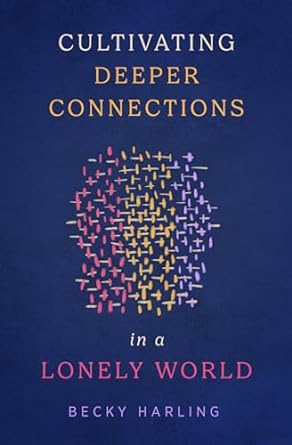How to Make Faithful Friends in a Secular World

According to the Surgeon General, loneliness is at an all-time high. Many are struggling with feelings of isolation. The statistics in the report confirm that half of Americans reported having fewer than three close friends (Surgeon-General – social advisory-report, pg. 13). That seems shocking! Over the past twenty years, it seems that social engagement and deep friendships have decreased. In today’s culture of technology and social media, where we are supposedly more connected than ever, it seems we’ve forgotten how to make and keep faithful friends. Yet, God is calling His people back to community and deep connection. After all it is the way He designed us for relationship both with Him and others.
Understanding this, how do we make faithful friends in a world that is secular and, at times, polarized? We begin by understanding how we were designed.
Designed for Relationship
God created us in His image. Way back in the book of Genesis, God said, “Let us make mankind in our image, in our likeness” (Genesis 1:26). The trinity, made up of Father, Son, and Holy Spirit, has existed from all eternity, enjoying beautiful fellowship. As people created in the image of a relational God, that is also God’s desire for us. After God created man, He went on to say, “It is not good for the man to be alone” (Genesis 2:18). Similarly, it is not good for you to be alone! As creatures designed to be relational, we have a strong need for community and a sense of belonging. In other words, we have a deep desire for faithful and loyal friends. When those needs are not met, the end result is loneliness. Friends were God’s idea.
Scripture tells us that “A friend loves at all times” (Proverbs 17:17) and that a sweet friendship refreshes the soul (Proverbs 27:9). We long for those types of friends, don’t we? That longing is God-given and an imprint of His divine nature. Deep, loyal friends bring joy and companionship to our lives. They walk alongside us in the journey of life, celebrating our victories and carrying our burdens. However, in this day of loneliness and isolation you might wonder, “Well, how do I get those friends?”
It takes intentionality.
Be the Kind of Friend You Desire
First and foremost, when looking for friends, take time to reflect on what you think makes a good friend. Chances are, what you feel makes a good friend is what others also think makes a good friend. After you’ve spent time reflecting on friendship, spend some time in prayer. Make a commitment to God that you will be the kind of friend to others that you desire. Then, seek intentionally to put the following practices into place in all your friendships:
Value Others
The surest way to develop faithful friends is to value others. As the Apostle Paul advised, “Do nothing out of selfish ambition or vain conceit. Rather, in humility value others above yourselves, not looking to your own interests but each of you to the interests of others” (Philippians 2:3-4). By valuing others and taking an interest in them, you will become a magnet for friendships. People naturally want to be with those who take an interest in who they are and in what they do.
Invite Others Into Your Home
Hospitality was a part of the early church culture. Believers invited others into their homes and shared a meal together. This is described in the book of Acts, “They devoted themselves to the apostles teaching and to fellowship, to the breaking of bread and to prayer… They broke bread in their homes and ate together with glad and sincere hearts” (Acts 2:42,46b). You don’t have to have people over for dinner necessarily. You could invite them for a cup of coffee or dessert. Either way, when others come into your home and enjoy feeling welcomed by you, friendship grows, and a deeper connection develops.
Learn the Art of Conversation
Conversation has become more challenging for many of us in our current culture. We’re so accustomed to writing emails, sending text messages, or posting a short blurb on social media, that we’ve forgotten how to engage in face-to-face conversations. As a result, despite our internet connections, we’re lonelier and more isolated than ever. What if we rediscovered and developed the art of meaningful conversation? This would involve asking great questions and allowing the other person to share their heart. In return the hope would be that they would ask you questions and you also would get to share your life. Conversations bring hope and joy to people because God designed us for conversation. The Apostle Paul wrote in his letter to the Thessalonian church that he was ready to “Share…not only the gospel of God but also our own selves” (1 Thessalonians 2:8). In deep conversation, we are able to share who we really are and as a result, we end up feeling less lonely.
Affirm the Good in Others
Nothing builds friendship quite like affirmations. In our cancellation culture of hate talk and accusing rhetoric, people are longing to feel affirmed. What if, we asked God to help us confirm the good we see in others rather than focusing on the negative? Imagine what a nicer world we would live in! Most people know their weaknesses. They don’t need you to point those out. Instead, many are starving for a little affirmation. So follow the example of Paul when he wrote to the Philippian believers, “I thank God every time I remember you” (Philippians 1:3). Imagine how you might make someone’s day by completing this sentence, “ I really admire_________ about you.” Or, “I thank God for you.” Maybe you admire their strength, or their joy, or their sense of humor. Possibly, you are thankful for their integrity, their humility, or their stability. Tell them. A little affirmation goes a long way to build bridges to people’s hearts.
Cultivate Loyalty
The Apostle Paul wrote, “Be devoted to one another in love. Honor one another above yourselves” (Romans 12:10). When we’re devoted to another, we are faithful to them. In many ways, loyalty is a forgotten quality in our culture. May I suggest we need to bring it back? I have several very close friends who have been in my life for over twenty years. We value loyalty and faithfulness in our friendships. Those qualities make our friendship richer and stronger. Here’s the thing: if we’re going to feel deeply connected in friendships, we must cultivate loyalty and faithfulness. These are the qualities that make up the fabric of lifetime friends.
In this day of loneliness, God is calling His people back into community and connection. His desire is that we take the initiative to cultivate deep friendships. While that might feel daunting to you, it’s easier than you might think. Simply be the kind of friend you desire. Value others, invite others into your home, learn the art of conversation, affirm the good, and cultivate loyalty. If you feel overwhelmed by that list, why not pick two and begin to work on those skills? Ask the Holy Spirit to love through you, and before long, you will be enjoying deeply bonded friendships.
Photo Credit: ©Getty Images/Giuseppe Lombardo


Originally published March 28, 2024.





